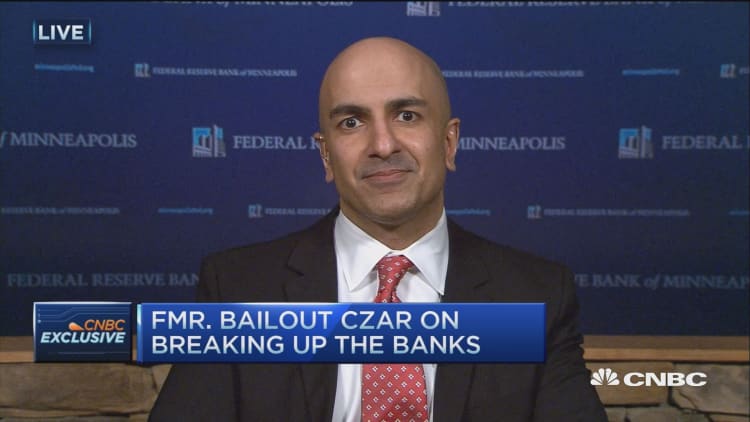
Post-financial crisis changes have made the financial system more stable, but policymakers need to acknowledge that large banks still pose systemic risk, Minneapolis Fed President Neel Kashkari contended Tuesday.
Kashkari, 42, started at the bank earlier this year and quickly made further regulation a top priority. On Monday, he hosted a symposium in Minneapolis called "Ending Too Big to Fail," where experts floated ideas about how best to make the financial system safer.
"I just don't want the American people to have a false sense of security that we've addressed 'too big to fail,' that this can't happen again," Kashkari told CNBC's "Closing Bell." "I think some of those risks remain. And we need to consider more transformational solutions to deal with this problem once and for all."
Kashkari, who previously worked at the Treasury Department and Goldman Sachs, has jumped into a debate that rages even after the passage of the Dodd-Frank Act. Policymakers continue to question whether the measures went far enough to reduce financial system risk, and Sen. Bernie Sanders of Vermont has made reining in Wall Street a cornerstone of his Democratic presidential campaign.
Fed Chair Janet Yellen has previously said Dodd-Frank made the system safer. The banking industry has largely resisted proposals for tougher regulations and calls from some in Congress to break up big banks.
Kashkari admitted larger capital requirements and stress testing are "steps in the right direction." However, he cautioned that the banking structure still poses more risks than some observers realize.
Some critics have noted that ending "too big to fail" may not fall within Kashkari's powers. Others, including former FDIC Chair Sheila Bair, have questioned why Kashkari has jumped into the discussion now, six years after President Barack Obama signed Dodd-Frank into law.
Kashkari contended that he simply wants to fuel a discussion on reducing risk in the financial system. He is currently evaluating possible policies including breaking up the large banks and requiring more capital reserves.
Kashkari said he does not yet know how the "ideal structure" would look.




